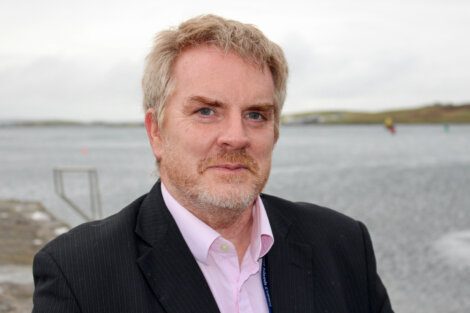Council / SIC finance chief says reaching sustainability is ‘not impossible’
SHETLAND Islands Council reaching financial sustainability is “difficult, but not impossible”.
That is the view of the local authority’s finance manager Paul Fraser, who said his job is to seek to narrow the gap and to “bring us as close to sustainability as we can”.
The council is regarded as being in an unsustainable financial position in the long term because of the draw it requires to take from its reserves to balance the books at the end of the year.
However, in recent weeks there have been some encouraging signs from internal auditor Audit Scotland.
Auditor Brian Howarth recently said he estimated that the council could have 15 years before its reserves are depleted at the current rate – a far more comfortable position than the five years a different auditor had previously suggested.
He said previous reports may have skimmed over the income the council receives from harbour activities, as well as returns on investments.
And there was a suggestion that Audit Scotland may not need to compile a separate follow-up report on an at-times critical ‘best value’ evaluation the SIC received in 2022.
It all comes as all SIC departments look to find savings in 2023/24.
Fraser, however, stressed that while the 15 years estimate is more positive than the previous five years, the position remains that the SIC is spending more than it receives.
“For me the important point is not the length of time but the fact that that is still a reality,” he said.
“I think it’s important that people understand this is not people saying ‘don’t worry, everything is fine’.
“The underlying position remains the same essentially, where we have a structural level of overspend where we automatically spend more than we have coming in, and then we use our reserves to balance that.
Become a member of Shetland News
“We are currently spending more than the level of the interest we earn, so we are essentially eating into the underlying reserves.
“So whilst that speed is perhaps slower, in this auditor’s view, but the fact is that it still remains that it’s still happening.”
Fraser is estimating a general fund gap of nearly £37 million in 2023/24, which is up by more than £4 million on the previous year.
The level of estimated expenditure (£190 million) is predicted to rise greater than the amount of income the SIC will receive (£153 million).
The SIC’s reserves – money invested in the financial markets which stems from old oil industry payments – were valued at £386 million at the end of July.
The investments are designed to gain value; from 2002/3 to 2021/22 the average return was 8.17 per cent a year, or £21.4 million.
Fraser said other local authorities would generally not regard themselves as sustainable, but he added that the SIC is in somewhat enviable position with its reserves.
“The reserves afford us a level of income potentially that would allow us to be sustainable at a spending level much beyond what the government is providing us,” he said.
“We obviously tend to focus very much on our expenses, and I think we also have to look at our income and what it is we do with the income that we already get.
“What do we do to reduce costs if we possibly can, and what do we do with the income and the extra income that we receive, and how do we get that closer to balance?”
Fraser said he has a level of sympathy with some elected members who call for the SIC to spend more from its reserves.
But he said it remains a “difficult situation”.
Fraser also said it is “inevitably difficult” for council departments to find savings in the current financial year as they balance the short term and long term.
He also pointed to the need for some departments to bring in more expensive agency staff to fill workforce gaps.
“My sense is that our emphasis needs to be on a much longer scale,” Fraser said.
“I think we tend to try and save the world annually, and actually we need to stand back and say we probably need to look at things that will take longer to deliver.”
Become a member of Shetland News
Shetland News is asking its many readers to consider paying for membership to get additional features and services: -
- Remove non-local ads;
- Bookmark posts to read later;
- Exclusive curated weekly newsletter;
- Hide membership messages;
- Comments open for discussion.
If you appreciate what we do and feel strongly about impartial local journalism, then please become a member of Shetland News by either making a single payment, or setting up a monthly, quarterly or yearly subscription.





























































